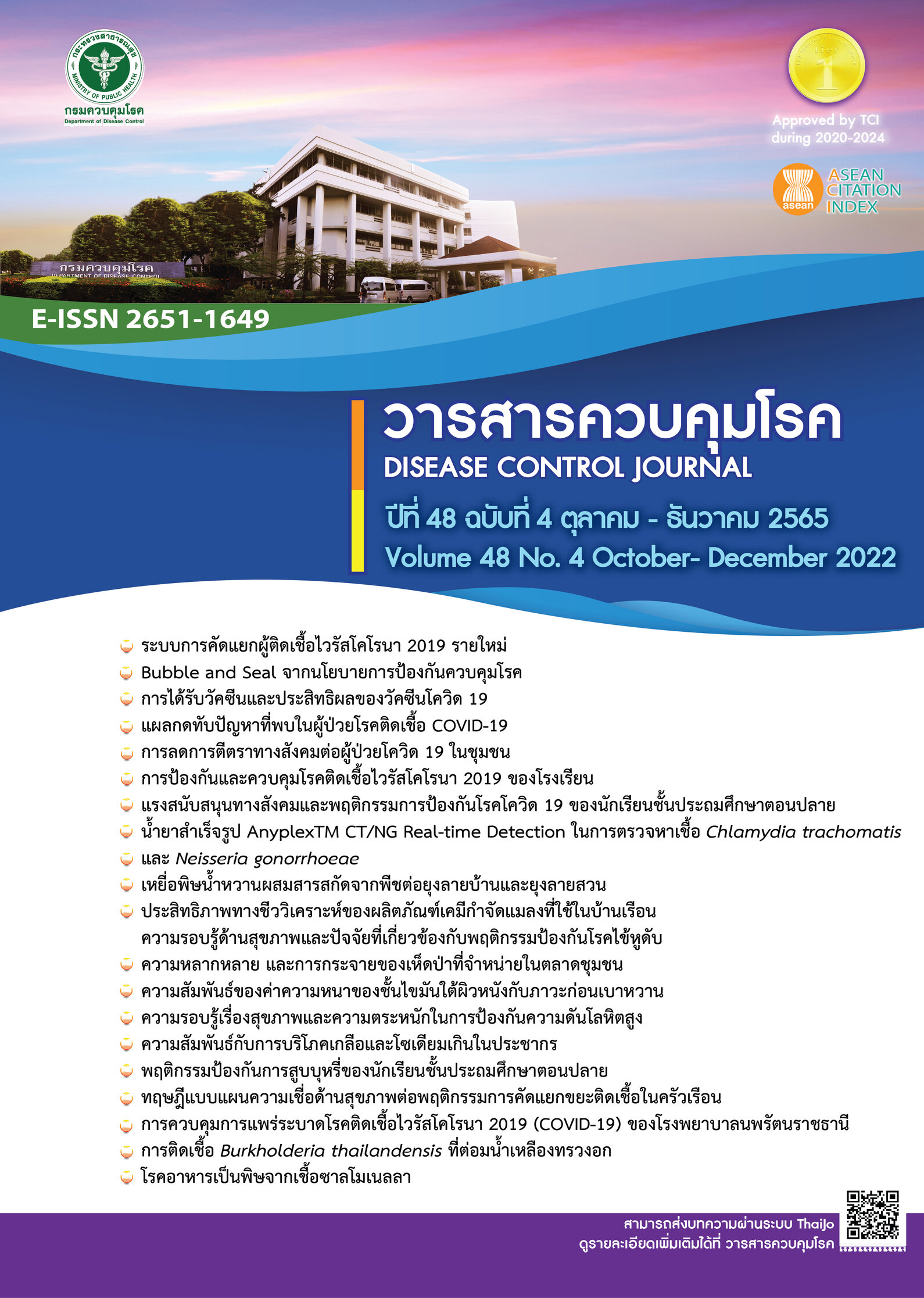Association between personal factors and health literacy and self-awareness on hypertensive prevention from users at public blood pressure station services
DOI:
https://doi.org/10.14456/dcj.2022.73Keywords:
hypertension, health literacy, self-awareness, public blood pressure monitorAbstract
The current study aimed to determine the association between personal factors and health literacy and self-awareness on hypertensive prevention. Data were collected at nine points of public blood pressure station services, which are located throughout Bangkok and Greater Bangkok areas, during March to July 2020 (5 months). Three hundred and eleven subjects have completed the questionnaire and the study found that: 1) overall health literacy and self-awareness on hypertensive prevention were significantly related (r=0.48, p=0.00). This indicated greater health literacy, greater self-awareness. The results also showed that subjects’ health literacy and self-awareness was at good level (78.73%) and great level (87.25%), respectively; 2) Both genders demonstrated no difference in health literacy (p=0.68) but difference in self-awareness significantly (p=0.03); 3) subjects with completed education under bachelor’s degree showed higher health literacy than other higher levels of education (p=0.05). However, overall self-awareness did not show any significant difference among them (p=0.06); 4) increasing age was related to greater health literacy and self-awareness. This is possibly because of more opportunity to receive and perceive key messages on health-related issues; and 5) higher educational level was related to lower health literacy, which is not consistent with previous studies i.e. the higher the education, the better the health literacy would be. The limitations of this study included the limited number of higher educational level subjects (n=10, 3.22%), whereas subjects who completed education under bachelor’s degree were presented as majority group (n=301, 96.78%). Further studies should be scaled up to include diverse educational level subjects, as well as continuing with risk communications/educating people to increase their health literacy and self-awareness on hypertensive prevention, and adjusting some items in the questionnaire for each specific group.
Downloads
References
Aekplakorn W, editor. Report of the Thai Population Health Survey by Physical Examination No. 5, 2014 [Internet]. 2559 [cited 2020 Feb 4]. Available from: https://thaitgri.org/?wpdmpro=รายงานการสำรวจสุขภาพปร (in Thai)
Aekplakorn W, Puckcharern H, Satheannoppakao W. Thai National Health Examination Survey, NHES VI (B.E.2562-2563). 2564 [cited 2021 Oct 25]. Available from: https://kb.hsri.or.th/dspace/handle/11228/5425 (in Thai)
World Health Organisation regional office for Europe. Prevention and control of noncommunicable diseases in the European Region: a progress report [Internet]. 2014 [cited 2017 Jul 5]. Available from: http://www.euro.who.int/__data/assets/pdf_file/0004/235975/Prevention-and-control-of-noncommunicable-diseases-in-the-European-Region-A-progress-report-Eng.pdf?ua=1
Health Data Center. HDC - Report [Internet]. [cited 2020 Feb 4]. Available from: https://hdcservice.moph.go.th/hdc/reports/report.php?source=pformated/format1.php&cat_id=b2b59e64c4e6c92d4b1ec16a599d882b&id=9702fa28cd2ec73ecc6af89d14f46874 (in Thai)
Urban Institute for Disease Prevention and Control. UIDPC joins the Department of Disease Control “Promote the Bangkok network to drive health awareness, Increase access to blood pressure measurement (public BP), conquer disease, reduce the risk of death.” UIDPC media press [Internet]. 2019 [cited 2021 Jun 1];1. Available from: https://www.ddc.moph.go.th/uploads/files/1046420191129095514.pdf (in Thai)
Bartlett JE, Kotrlik JW, Higgins CC. Organizational Research Determining Appropriate Sample Size in Survey Research. Inf technol learn perform j [Internet]. 2001 [cited 2021 Oct 25]. 19(1);43-50. Available from: https://www.scirp.org/(S(i43dyn45teexjx455qlt3d2q))/reference/ReferencesPapers.aspx?ReferenceID=1588649
Digital Health Europe. Health literacy - DigitalHealthEurope [Internet]. 2020 [cited 2021 Feb 7]. Available from: https://digitalhealtheurope.eu/glossary/health-literacy/
Gazmararian JA, Williams M V, Peel J, Baker DW. Health literacy and knowledge of chronic disease. Patient Educ Couns. 2003;51(3):267–75.
Center for Disease Control and Prevention. Hypertension Prevalence and Control Among Adults: United States, 2015–2016 [Internet]. 2017 [cited 2021 Feb 7]. Available from: https://www.cdc.gov/nchs/products/databriefs/db289.htm
Bureau of Non-communicable Diseases (TH). Behavioural Risk Factor Surveillance System-NCD and Injury. Nonthaburi; 2018. (in Thai)
World Health Organisation. Integrated care for older people (ICOPE): Guidance for person-centred assessment and pathways in primary care. Geneva: World Health Organization; 2019. 96 p.
Alm-Roijer C, Stagmo M, Udén G, Erhardt L. Better knowledge improves adherence to lifestyle changes and medication in patients with coronary heart disease. Eur J Cardiovasc Nurs [Internet]. 2004 Dec [cited 2021 Feb 8];3(4):321–30. Available from: https://pubmed.ncbi.nlm.nih.gov/15572021/
Downloads
Published
How to Cite
Issue
Section
License
Copyright (c) 2022 Disease Control Journal

This work is licensed under a Creative Commons Attribution-NonCommercial-NoDerivatives 4.0 International License.
Articles published in the Disease Control Journal are considered as academic work, research or analysis of the personal opinion of the authors, not the opinion of the Thailand Department of Disease Control or editorial team. The authors must be responsible for their articles.






